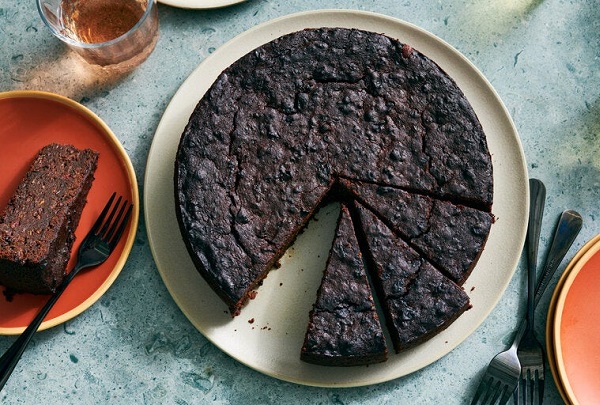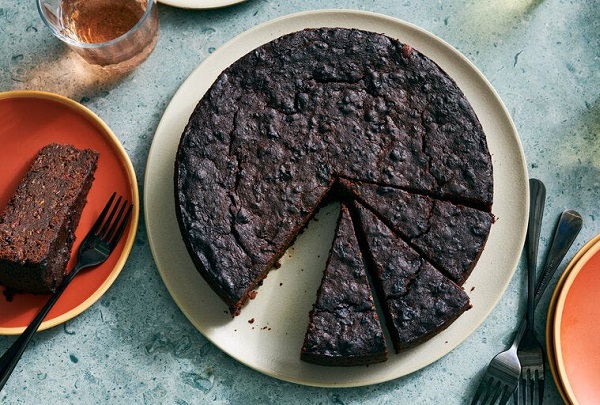
Ramin Ganeshram, author of Sweet Hands: Island Cooking from Trinidad and Tobago, writes, “For many in the Caribbean diaspora, there is no substitute for this deeply flavorful fruitcake.” Read the full article in The New York Times, and get the original recipe, created by Marva Adams-Miller and adapted by Ganeshram, at Times Cooking.
By Thanksgiving week, every surface of Marva Adams-Miller’s Brooklyn home is crowded with bags of flour and brown sugar, bottles of spices and dried fruits soaking in buckets of liquor. Ms. Adams-Miller is one of an elite group baking Caribbean black cake in late fall and the Christmas holiday season and turning cultural need into entrepreneurial opportunity. From the end of October to Christmas week, Ms. Adams-Miller normally bakes black cakes eight to 10 hours daily, outside of her full-time job working with city youth.
Ms. Adams-Miller, who lives in Mill Basin and is from Trinidad & Tobago, learned to make the cake in 1985 from her father, a pastry chef. When she moved to Brooklyn, in 1993, “word got around that I made a good black cake, and I’ve been making them yearly ever since.” She charges $60 for a nine-inch cake.
Alternatively called rum cake, fruit cake or great cake, this dessert most likely came to the Caribbean in the 18th century with English and Irish colonizers, who substituted local rum for whiskey in their traditional Christmas fruitcake. At some point, burnt sugar syrup was added, turning the cake almost black. It has been a West Indian holiday staple, as well as the go-to wedding cake, for centuries. The recipe for black cake is so storied it has even inspired a best-selling novel that has been adapted into a series on Hulu.
Its importance in Caribbean culture means that bakers are always in demand. Across ethnicity and profession, they enjoy an exalted status in the community because they keep clients close to their culture. For most of its history, the recipe wasn’t codified, so those who could make it well — usually women — were community treasures. Black cake baking is a cottage industry in the West Indies that continues among Caribbean immigrants worldwide.
Many prefer to buy the cake from an experienced baker, rather than make it themselves, as the ingredients required — currants, raisins, candied cherries, citron and prunes soaked in rum, cherry wine or brandy — can be costly. The fruits are soaked for a minimum of three weeks, although the most hard-core bakers will soak them for a year or more. The finished cake is also basted with liquor, then “cured” for several weeks.
For some bakers, like the chef Deborah Charles, who is Guyanese and lives on the Upper East Side, the cost makes selling black cakes as a large-scale business prohibitive. “I used to sell them yearly, but I learned that if I wanted to make the cakes the way I do for my family — using premium Demerara rum and sugar — it’s too expensive to sell in volume,” she said. “ I just bake for a select few clients who are willing to pay $150 for a premium cake.”
Despite the price, demand remains high throughout the Caribbean diaspora, in cities like New York, Toronto, Atlanta, Miami and Hartford, Conn. Because of this, although usually being one-person operations, sellers like Yvonne Jackson, of Hamden, Conn., can match the sales of more established outfits, like Royal Caribbean Bakery in Mount Vernon, N.Y.
Royal Caribbean sells roughly 500 black cakes every holiday season, ranging in price from $40 to $100. Ms. Jackson, who finds clients through the Caribbean community and Facebook, can make upward of 300 cakes per year at $20 per pound in the same time frame. Her average cake weighs two pounds.
For Ms. Jackson, who was born in Jamaica, baking black cake is one of multiple “hustles” outside the various day jobs — FedEx clerk, cosmetologist and notary public, to name a few over the years — that have allowed her to send money home.
For those who consider black cake a particular memory of home, only homemade will do. That’s why cottage bakers work grueling hours to fill increasing demand. [. . .]
Read full article at https://www.nytimes.com/2023/11/24/dining/black-cake-recipe.html; access recipe at https://cooking.nytimes.com/recipes/1024875-caribbean-black-cake
Ramin Ganeshram is the author of Sweet Hands: Island Cooking from Trinidad and Tobago (Hippocrene Books, 2018, 3rd Edition); see https://www.hippocrenebooks.com/store/p438/Sweet_Hands%3A_Island_Cooking_from_Trinidad_%26_Tobago_%283rd_Edition%29.html
Ramin Ganeshram, author of Sweet Hands: Island Cooking from Trinidad and Tobago, writes, “For many in the Caribbean diaspora, there is no substitute for this deeply flavorful fruitcake.” Read the full article in The New York Times, and get the original recipe, created by Marva Adams-Miller and adapted by Ganeshram, at Times Cooking. By Thanksgiving week,







